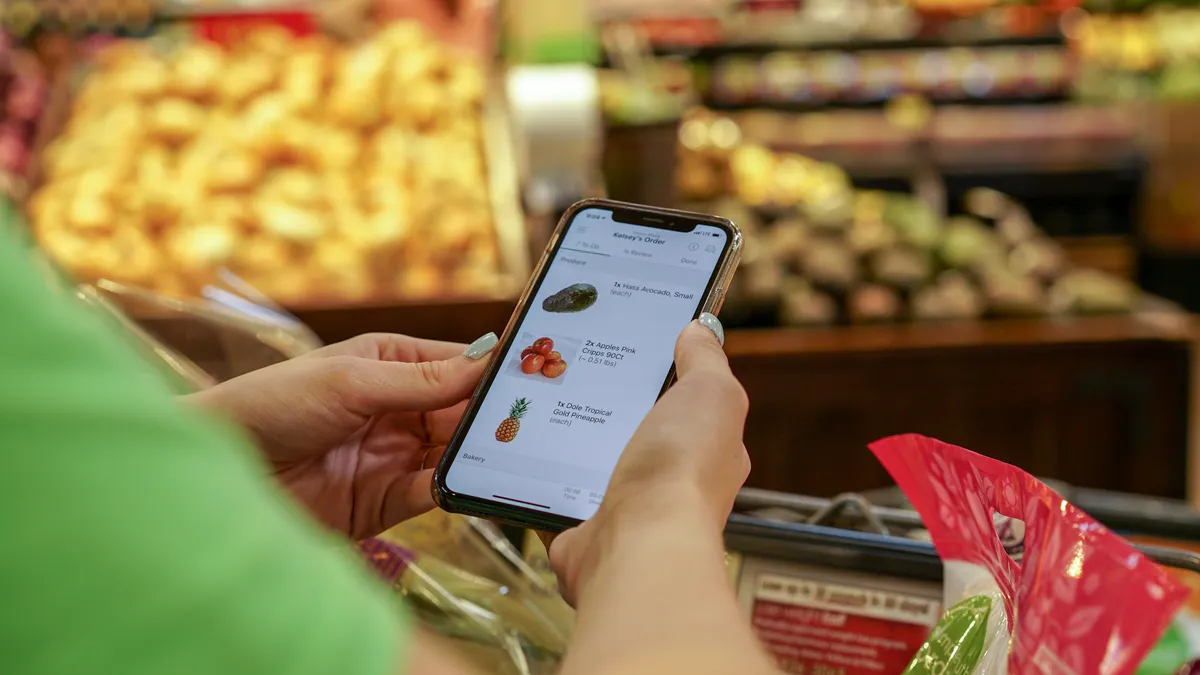Dive Brief:
- Instacart is suing Uber-backed online grocery rival Cornershop, claiming it stole significant portions of its product catalog and is using that information on Cornershop’s app and website.
- In the suit, which was filed in the U.S. District Court in the Eastern District of Texas, Instacart alleges Cornershop “scraped” product photos, descriptions, pricing data and other information from Instacart and used that information on its own platform as it launched delivery in Dallas and Miami earlier this year. Cornershop workers modified the names of the files that stored the information in order to conceal their ownership, Instacart claims.
- Instacart said it sent a cease-and-desist order to Cornershop earlier this week that the company initially said it would comply with but has failed to do so. An Uber spokesperson told Grocery Dive: “Instacart is facing a new challenge in the US from a Chilean upstart, and it’s unfortunate that their first move is litigation instead of competition. Cornershop will be responding to this complaint but won’t be deterred in bringing grocery delivery to more customers in the US.”
Dive Insight:
In court documents, Instacart said it sent a cease-and-desist order to Cornershop on July 13 asking it to cease scraping data and listing its proprietary product information, and that Cornershop responded a day later to say it had complied. However, Instacart claims Cornershop has continued scraping information and that it still lists thousands of misappropriated images and other information on its platform.
In its lawsuit, Instacart claims that more than 18,000 product images listed on Cornershop’s platform as of late June were lifted from Instacart. “Cornershop has likewise copied pricing and product data from Instacart,” according to the suit.
In product images provided in the suit, including a bag of chicken leg quarters and a container of hummus, the images credited to Cornershop appear to match those credited to Instacart.
Instacart said in the suit it has spent more than $17 million developing and refining its product catalog. In 2015, the company launched its Mobile Photo Studio, which relies on its personal shoppers and retailers to photograph products for inclusion on the company’s online platform. Those images are then retouched by Instacart as needed and filed by the company as intellectual property.
In a blog post detailing the reasoning behind its lawsuit, Instacart claims Cornershop has posted positions for engineers with skills like “advanced scraping” and “bypassing ‘rate limiting’” that could help it mine and conceal critical information — indicating the effort was strategic on Cornershop’s part.
Cornershop’s response via an Uber spokesperson saying that it “won’t be deterred” from putting pressure on Instacart in the U.S. underscores the competitive stakes as the ride-hailing firm, which has a history of taking aggressive tactics against competitors, expands into grocery delivery.
Founded in Chile in 2015, Cornershop has linked up with retailers throughout Latin America and earlier this year started fulfilling orders in Miami and Dallas. The company, which has referred to itself in the past as being modeled after Instacart, will be the fulfillment arm for Uber’s U.S. grocery delivery push announced earlier this month. Uber's service will allow users to shop for groceries and schedule deliveries through the Uber and Uber Eats app. Uber bought a majority stake in Cornershop last October, and the final acquisition is pending regulatory approval in Chile, which Uber expects to receive soon.
Uber also recently acquired Postmates for $2.65 billion, signaling its intent to move beyond its core ride-hailing service. In the 30 countries where the company has tested grocery delivery, orders have increased 176% since February, the company recently said.
Online grocery sales have risen to record levels in the U.S. as shoppers shift their buying habits during the pandemic. Instacart has been one of the main beneficiaries of that shift. The company recently raised $225 million in new funding and has a valuation of $13.7 billion.













